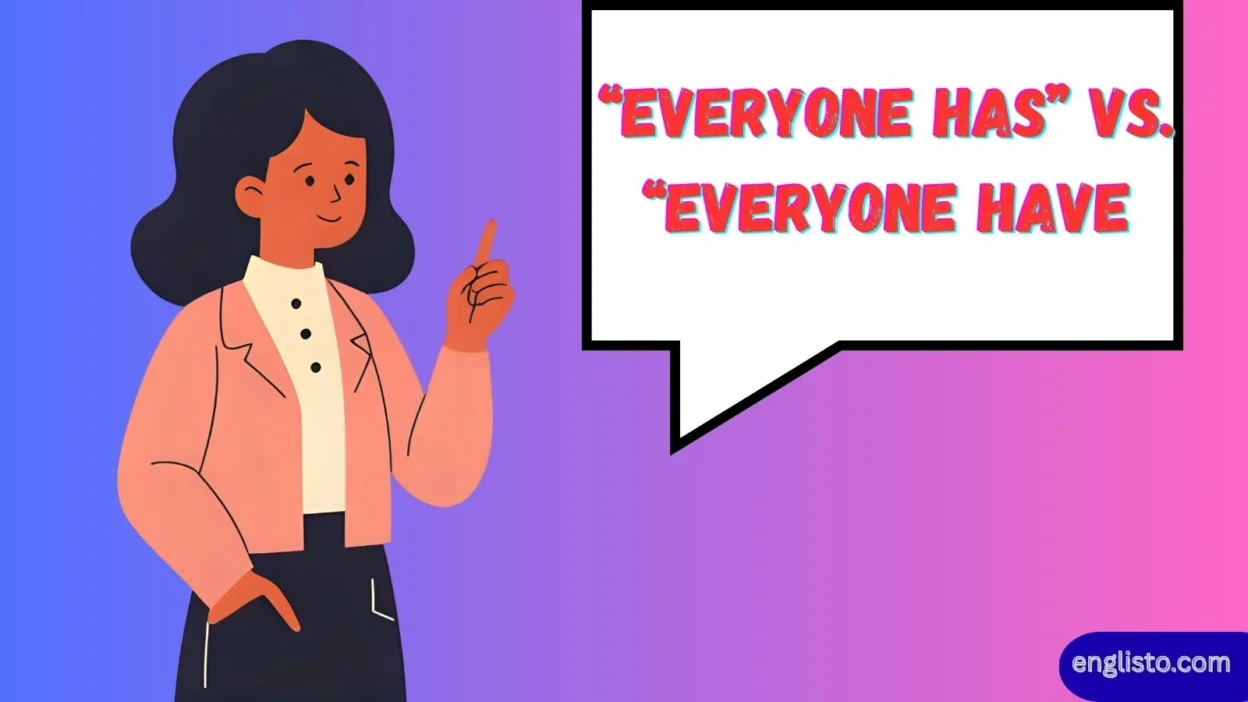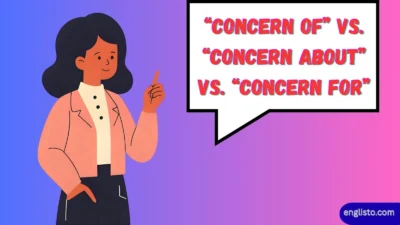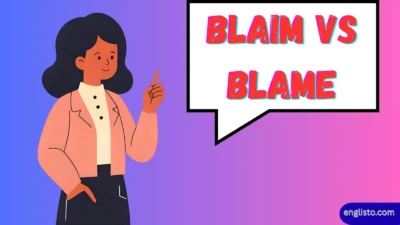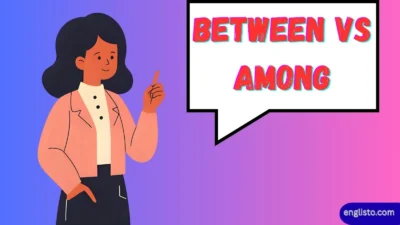Language can be tricky, especially when small differences in grammar completely change whether a sentence sounds correct or not. One of the most commonly confused expressions in American English is the debate between “Everyone has” and “Everyone have.” “Everyone Has” vs. “Everyone Have.
At first glance, both might seem fine. After all, “everyone” refers to more than one person, right? So why not use the plural verb have? The answer lies in subject–verb agreement, the way English connects a subject with the proper verb form. In this article, we’ll dive into why “everyone has” is grammatically correct in standard American English, when you might mistakenly see “everyone have,” and how to avoid this common grammatical error.
We’ll also cover real-life examples, show you comparison tables, explain exceptions, and share tips that make the rules easier to remember. By the end, you’ll know exactly which form to use and why.
The Core Difference: Why “Everyone Has” Is Correct
To understand the difference, let’s start with the grammar basics.
- Everyone is an indefinite pronoun.
- Despite referring to a group of people, indefinite pronouns like everyone, somebody, anyone, and nobody are singular.
- Because everyone is treated as singular, it takes the singular verb has instead of the plural have.
Think of it this way: everyone = each individual person.
Correct: Everyone has a chance to speak.
Incorrect: Everyone have a chance to speak.
The singular treatment comes from the fact that we’re referring to each member of a group separately, not the group as a whole.
Read More: Eachother or Each Other: How to Spell ‘Each Other’ Correctly
Subject–Verb Agreement with “Everyone”
Subject–verb agreement is one of the cornerstones of English grammar. Let’s break it down in detail:
| Subject Type | Verb Form | Example Sentence |
| Singular noun | Singular verb | The student has finished homework. |
| Plural noun | Plural verb | The students have finished homework. |
| Indefinite pronoun (e.g., everyone, everybody) | Singular verb | Everyone has finished homework. |
Notice how everyone follows the same rule as a singular noun, even though the meaning refers to many.
This is why “everyone has” is always correct in formal American English.
Common Misconceptions: Why People Say “Everyone Have”
So why do people sometimes say everyone have if it’s wrong? A few reasons:
- Plural feeling of “everyone”
Since “everyone” refers to multiple people, many assume it should take a plural verb. But grammatically, it doesn’t. - Influence of spoken language
In casual speech, especially in certain dialects, you’ll hear “everyone have” slip out because spoken English is more forgiving. - Confusion with related words
Compare:
- All have (plural, correct)
- Everyone has (singular, correct)
- All have (plural, correct)
- People sometimes mix up all with everyone, even though they follow different rules.
Real-Life Usage Examples
Here’s how the two forms appear in everyday situations:
| Situation | Correct Usage | Incorrect Usage |
| Classroom | Everyone has their book ready. | Everyone have their book ready. |
| Workplace | Everyone has completed the report. | Everyone have completed the report. |
| Social | Everyone has a story to tell. | Everyone have a story to tell. |
| Travel | Everyone has a seat on the bus. | Everyone have a seat on the bus. |
The incorrect form often appears in casual conversation or online forums, but it doesn’t pass the standard grammar test.
Comparing “Everyone Has” with Similar Pronouns
Other indefinite pronouns follow the same rule:
| Indefinite Pronoun | Correct Verb | Example |
| Everyone | has | Everyone has a phone these days. |
| Everybody | has | Everybody has their own opinion. |
| Anyone | has | Anyone has the ability to learn. |
| Nobody | has | Nobody has seen the missing file. |
Notice that all of these take has, never have.
“Everyone Has” vs. “All Have”
Another big source of confusion is between everyone and all.
- Everyone has → Focuses on individuals separately.
- All have → Refers to a group collectively.
Example:
- Everyone has their own desk. (each person separately)
- All have desks. (the group collectively)
This subtle difference explains why the forms aren’t interchangeable.
Historical and Cultural Notes
Interestingly, debates about “everyone has” vs. “everyone have” go back a long way. Grammar forums and usage guides from as early as November 17, 2011 and Dec 8, 2021 show learners struggling with the same confusion.
Some British English speakers may bend the rule slightly in very casual contexts, but in standard American English, everyone has is non-negotiable. Teachers, exams, and professional writing always require the singular form.
Why Grammar Precision Matters
Some might argue, “People will understand me either way, so why does it matter?” Here’s why:
- Credibility: Using correct grammar builds authority in academic writing, job applications, and formal communication.
- Clarity: Mistakes can cause hesitation or confusion in the reader’s mind.
- Consistency: Grammar rules keep language predictable and reliable.
Think of grammar as the framework that keeps communication efficient.
Idioms and Famous Sayings with “Everyone Has”
You’ll often see “everyone has” in idioms or quotes:
- Everyone has a bad day.
- Everyone has their own story.
- Everyone has expectations in life.
- Everyone has a role to play.
These phrases reflect real-life truth: while each person is unique, grammar treats them one at a time.
Trickier Cases and Exceptions
Sometimes sentences get complicated, and that’s where confusion grows. Let’s look at a few tricky cases:
- Possessive pronouns:
Everyone has his or her book. (traditional form)
Everyone has their book. (modern, gender-neutral form – now widely accepted) - Negative statements:
Not everyone has the same opinion. - Questions:
Does everyone have a pen?
Notice here that the auxiliary does is singular, even though it’s followed by have.
Quick Grammar Guide
Here’s a quick reference table to make it easy to remember:
| Expression | Correct or Incorrect? | Why |
| Everyone has | Correct | “Everyone” is singular. |
| Everyone have | Incorrect | Verb doesn’t agree with singular subject. |
| Does everyone have? | Correct | Auxiliary does matches singular subject. |
| All have | Correct | “All” is plural. |
Everyday Conversation Tips
- If you’re in doubt, replace “everyone” with “he” or “she.” If the sentence still makes sense, then “has” is correct.
Example: He has a book → Everyone has a book. - Remember: everyone is about each person individually, not the crowd together.
- Watch out in fast speech. It’s easy to slip into “everyone have,” but polished communication avoids it.
FAQs About “Everyone Has” vs. “Everyone Have”
Q1. Why is “everyone has” correct and not “everyone have”?
Because “everyone” is grammatically singular, it requires the singular verb “has.”
Q2. Can “everyone have” ever be correct?
Only in a question with “does,” such as Does everyone have a ticket? Otherwise, it’s incorrect.
Q3. Is “everyone” singular or plural?
“Everyone” is always treated as singular, even though it refers to many individuals.
Q4. How do I remember the rule?
Think of “everyone” as “each one.” Since “each one has” is correct, so is “everyone has.”
Q5. Do British and American English differ on this?
Both follow the same grammar rule, but British English in casual speech may bend it more often. In formal American English, “everyone has” is the standard.
Conclusion
In the debate between “everyone has” and “everyone have,” the answer is clear:
- Correct: Everyone has
- Incorrect: Everyone have
“Everyone” may sound plural, but it functions as a singular indefinite pronoun, and therefore takes a singular verb. This rule applies across contexts, whether you’re writing essays, chatting in forums, or preparing for standardized tests like the GMAT.
Mastering this distinction not only avoids grammatical errors but also sharpens your communication skills. After all, as the famous saying goes:
“Everyone has something to contribute.”
And when it comes to grammar, that contribution is clarity, confidence, and precision.



